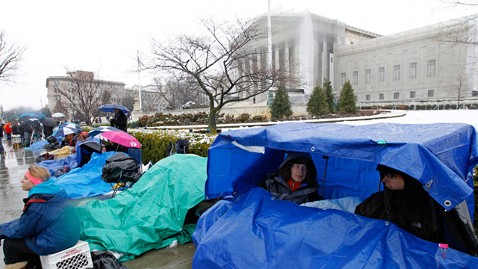Sleep-Deprived and Shivering at the Supreme Court

Joey Williamson, left, and Gary Brown form New York City, cover from the snow as they wait in line outside of the U.S. Supreme Court, in Washington, March, 25, 2013, a day before the case for gay and lesbian couples rights, will be argued before the Supreme Court. Photo Credit: Jose Luis Magana/AP Photo
Despite Washington's frigid temperatures and freezing rain Monday, a virtual tent city of activists both for and against same-sex marriage braved the elements together, holding a spot and a hope to see history unfold.
Supreme Court oral arguments challenging the Defense of Marriage Act (DOMA) and California's Proposition 8 are set to take place on Tuesday and Wednesday of this week, but Jason Wonacott has been camped out since last Friday.
"I've seen pretty much all four seasons since then in terms of weather," said Woncott.
Wonacutt, a California native, feels a special connection to the Prop 8 case in particular.
Related: Proposition 8 at the Supreme Court
"One day I would hope to get married because I am a gay man… I would like to get married in my home state," said Wonacutt.
Covering his sleeping bag with a large blue tarp to stave off the wet conditions, Wonacutt still cracked a smile through the chill.
"Now that we are less than 24 hours, I definitely think that it's been worth it. It's been an amazing experience, meeting other supporters and people from around the country who care about this issue," said Wonacutt.
Self-proclaimed activist Karanja Gacuca traveled to Washington from New York over the weekend to stake out the Court. He compared the same-sex marriage arguments to another historic civil liberties case.
As a black man, it's not that long ago that there were people who stood up and didn't believe that I was afforded equal protections under the law," said Gacuca.
But Nate Oppman faced the arctic-like conditions on Capitol Hill in support of the other side of the issue.
" I hold to a traditional Christian ethic of sexuality between a man and a woman in marriage and that goes for everything. So I would say that the state should uphold the thing that will under gird society and that's the family unit that has been the building block of society since the beginning of time," said Oppman, an Iowa native now living on the East Coast.
Related: Gay Marriage Cases: What You Need to Know
"I don't really identify people based on their sexuality. I think that all people are created by God and are created equal and have equal rights, but I do think that we have moral questions that we have to solve and I view sexuality as a moral question," said Oppman.
Oppman recognized the potentially "historic impact" of these Supreme Court decisions.
He said he believes a ruling in favor of same-sex couples, "could do long term damage to our historic understanding of rights and also to the family, the fabric of America."
The Supreme Courtroom has 240 seats for the public, groups and guests of the Court.
A minimum of 60 to 70 seats will be made available to the general public for the entirety of the arguments, while 30 seats will rotate between people who are able to observe 3-5 minutes of the proceedings.